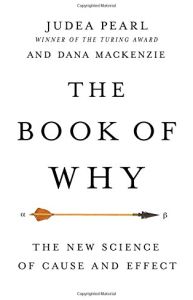With the help of popular-science writer Dana Mackenzie, the brilliant Judea Pearl attempts to convey complex mathematical concepts to ordinary people. For nearly everyone, much of the explanation will raise as many questions as answers. Yet, most of Pearl’s ideas come through quite clearly. In these cases, the average reader will enjoy an entertaining romp through correlation and causation and come away with a better sense of how to get to the “why” of things. Readers well-versed in postgraduate mathematics and statistics will undoubtedly gain much more.
The term “causation” has long been banished from the lexicons of mainstream statisticians. The same taboo has made it difficult for scientists to address causal questions of great importance to society.
Humans naturally think in terms of cause and effect. For example, a three-year-old knows that tipping a cup will spill milk across the table. No mathematician will succeed in convincing the child that causes don’t exist and that only probabilities, relationships and correlations do. But when the child grows up and enrolls in higher-level math and statistics courses, he or she learns the heresy of causation as well as the mantra that “correlation does not imply causation.” Scholars become hesitant even to think about causation, let alone speak the word in published work. And yet, as normally functioning human adults, they reason causally all the time. For example, they press the brake pedal in full expectation that this will cause their cars to stop.
As late as the 1800s, scientists thought only in terms of causation. However, in the late 19th century, in an attempt to show causation in genetically inherited traits (that is, intelligence running in...
Judea Pearl, PhD, is a UCLA computer science professor, the winner of the 2011 ACM Turing Award and one of the most respected AI scientists in the world. Dana Mackenzie, PhD, is a mathematician turned science writer who has written for Science, New Scientist, Scientific American, Smithsonian, Nautilus and Discover.








Comment on this summary